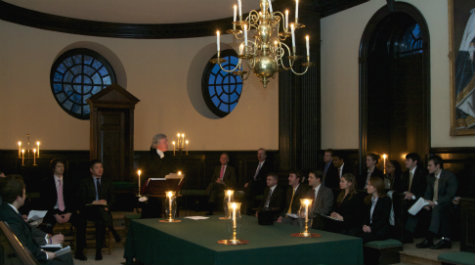Law School Tradition of Mock Legislature Returns to Colonial Capitol
The doors of the candle-lit chambers of Colonial Williamsburg's House of Burgesses opened, flooding the room in the Capitol Building with light. Thomas Jefferson walked into the room with the gravitas expected of a founding father. He strode up to the lectern, where he began to address the group about the historical workings of the state legislature.
Jefferson's appearance perfectly suited the event, a mock legislature held by the George Wythe Society on Feb. 16. The event revived a 230-year-old tradition started by Wythe, William & Mary's - and the nation's - first professor of law.
During Wythe's tenure at the College in the 1780s his students met on Saturdays in the very same chambers and debated matters pending in the Virginia General Assembly. In an email to law students announcing the George Wythe Society's plan for the event, Law School Dean Davison Douglas noted that Wythe "viewed this as an important part of legal education, because our law school was established for the express purpose of training political leaders."
Douglas opened the proceedings with brief remarks commending the society for its efforts in organizing the event before introducing Sen. Thomas Norment, Jr., majority leader of the Senate of Virginia and a 1973 graduate of the Law School. Norment played the role of speaker, moderating the debate among the 25 law students participating in the proceedings and ensuring that the rules of debate were followed.
Norment introduced Jefferson before the legislature officially convened. Jefferson spoke on a variety of topics, including his time at the College of William & Mary, his tutelage in law under George Wythe, and the history of Virginia's legislative body. His remarks laid the groundwork for the debate to come, as he admonished the students in attendance that although they may have differences of opinion, they should never let that give way to differences in principles.
Jefferson, who was dressed in the 18th-century garb of a gentleman, remarked on the students' modern business attire before departing. He noted with amusement that he had worried beforehand that he would need to apologize for his somewhat haggard appearance, having ridden into town on horseback. But upon seeing the assembly, he thought better of it.
"I've always believed in dressing for comfort, but you all have overwhelmed me," he said.
After Jefferson took his leave, Norment took to the lectern again, and he and the secretary quickly disposed of procedural matters. This included a role call and convening the assembly for official business.
Norment then proceeded to the first of the two issues to be debated during the session: whether the assembly should pass S.R. 721, a resolution to repeal the Virginia constitutional amendment defining marriage as between one man and one woman.
The motion was raised by one of the student legislators. Debate then commenced, with each side taking turns providing arguments for their respective positions on the issue.
Although the debate was passionate and, at times, a little heated, the format of the proceedings kept interactions cordial. For instance, the legislators were not allowed to interrupt a speaker on their own - they needed to first be recognized by Norment, who then asked the current presenter whether he or she would yield for a question.
This formality was at times entertaining and comical, but it served a purpose. By avoiding direct confrontation and requiring each side to hear the other out, the rules allowed for a more reasoned and respectful debate - a testament to Wythe's original intent for his 18th-century mock legislatures for law students.
Upon conclusion of all arguments, Norment put the resolution to a vote. The legislators weren't the only ones voting - any person in attendance was encouraged to vote. The secretary made his way around the room, first counting the Ayes, then the Nays. The Ayes carried the vote, and the resolution passed 19-12.
Norment then moved the assembly on to the second issue, which was a bill stating that no citizen of Virginia could be compelled to purchase or maintain a health insurance policy.
As the evening's proceedings approached the two-hour mark, the speaker reminded the student legislators that the historic setting imposed some unusual constraints. When the final student requested to speak, Norment replied: "Very briefly - the candles are getting short."
The second issue was then put to a vote, and it passed 17-15.
Norment adjourned the assembly after the final vote. He took a few moments to give his thoughts on the event.
"You all have enjoyed tonight, I think, [it was] a great educational opportunity," he said. He noted that both matters debated had been considered during his time in the Senate of Virginia. "These are very, very real issues," he said.
George Wythe Society President Meg McEvoy '12 said that the mock legislature "far exceeded my expectations - the students did a wonderful job. Organizing this event has been very rewarding. I am so glad the George Wythe Society could play a role in reviving this tradition, and I hope the mock legislature will become an annual event for William & Mary Law School."
